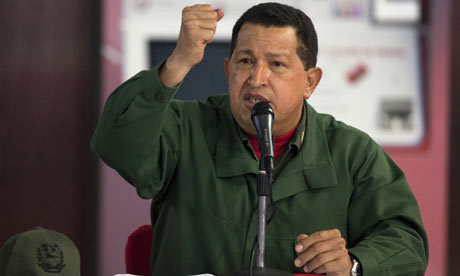Troops will seize control of businesses raising prices after currency devaluation as Venezuelans go on shopping spree The president of Venezuela, Hugo Chávez, has warned businesses not raise prices in the wake of a big currency devaluation. Photograph: Carlos Garcia Rawlins/Reuters President Hugo Chávez has ordered Venezuelan troops to raid shops and businesses that raise prices today in the wake of a big currency devaluation. "Right now, there is absolutely no reason for anybody to be raising prices of absolutely anything," he said yesterday . "I want the national guard on the streets with the people to fight against speculation. Publicly denounce the speculator and we will intervene in any business of any size." Venezuelans went on a shopping spree over the weekend, with queues stretching outside shopping malls, in anticipation of prices rocketing following the announcement late on Friday that the bolívar, which has been fixed at 2.15 to the dollar since 2005, would be devalued in a new multi-tiered exchange rate. It will be fixed at 2.6 for the import of essential goods and 4.3 for non-essential goods. Analysts said the measure would fuel inflation – already one of the world's highest at 25% – and further hit Chávez's dipping popularity. Speaking on his weekly TV show yesterday, Chávez said blame for any price rises would lie with speculators. The socialist leader told his defence minister to prepare an "offensive" against speculators and gave out telephone numbers to report price gouging. He announced $1bn (£620m) of credits and subsidies to boost the economy, which contracted 2.9% last year, in advance of legislative elections in September. Shoppers in the capital, Caracas, did not seem reassured and continued to stock up on TVs, DVD players and other goods in the belief that steep price hikes were imminent and inevitable. The finance minister, Alí Rodríguez, said the devaluation would add 3-5% to inflation. Some analysts predicted a higher spike and warned that a multi-tiered currency regime would stoke corruption and inefficiency. Economists said the measure, though painful for ordinary Venezuelans, should ease distortions in the economy of South America's top oil exporter and relieve pressure on the state oil company, PDVSA. Chávez had long ruled out a devaluation and vowed last year that the global financial crisis would not touch "a hair" of Venezuela's economy. A tumble in oil revenues from record highs squeezed the government's free-spending ways and changed his mind. The president announced the U-turn late on Friday during a crucial baseball game and avoided using the word devaluation. State media followed suit and referred to "adjustments". In another surprise statement, the former tank commander said he ordered two F-16 jets to intercept a US military plane that twice entered Venezuelan skies on Friday. "They are provoking us, these are warplanes," he said, brandishing a photo of a P-3 plane. Chávez has accused the US of plotting an invasion. The Pentagon admitted one of its aircraft entered Venezuelan airspace last May but denied that any US military aircraft did so on Friday. Venezuelan opposition politicians accused the president of trying to cause a distraction and bloggers said the photo appeared to be one uploaded to Wikipedia in 2005. After 11 years the president's socialist revolution has nationalised key industries and regulated much of the private sector. He retains support in the slums, but his popularity has slumped in recent months because of inflation, violent crime and crumbling public services. Electricity and water are severely rationed. The opposition, which hopes to wrest control of the national assembly in the elections, branded the devaluation as "black Friday" and another sign of government incompetence. "By establishing the exchange rate at 4.3 bolívares per dollar, the quality of life for Venezuelans is automatically devalued since we now have half the money we had before," said Antonio Ledezma, the mayor of Caracas and a Chávez opponent.Venezuela president Hugo Chávez warns shops not to raise prices

Monday, 11 January 2010
Posted by
Britannia Radio
at
19:45
![]()





















